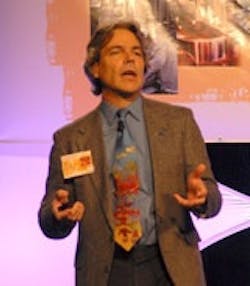Process Safety: Design for Failure Needed
To view Paul Gruhn's presentation click here.
In his keynote presentation to Rockwell Automations Process Solutions User Group meeting this week in Chicago, Paul Gruhn, process safety expert, took his audience on a sobering ride through the modern history of chemical and refinery disasters: Flixborough, U.K., 1974; Seveso, Italy, 1976; Bhopal, India, 1984; Texas City, U.S., 1995. On and on the litany of disasters wentand the knowledge that each of them could have been prevented.
Gruhn, currently of Rockwell Automations recently acquired ICS Triplex unit, noted that 44% of failures occurred when the systems did exactly what they had been designed and programmed to doand failed anyway. Less than 15% of accidents can be blamed on operator or maintenance error, Gruhn said. Bad things keep happening, Gruhn explained, and theres a record of a lack of commitment to what it takes to really solve the problem. He listed the statement of the plant manager of Union Carbide, Bhopal, and the statement of the Coast Guard commander in Alaska after the Exxon Valdez disaster as he showed a picture of an ostrich with its head buried in the ground. Systems arent perfect, stuff goes wrong. We need to design for failure, Gruhn said.
Its not enough to say Heres your hardware, have fun. ICS Triplexs Paul Gruhn on the growing need for safety system engineering, integration and technical services.
We are beginning to see the development and implementation of safety fieldbuses from Fieldbus Foundation, Profibus Trade Organization, and the HART Foundation, he said, and we are seeing integration of the basic process control system with the safety systemnot by using the same products, but at the vendor level. People are demanding that the DCS vendor integrate the safety system from one single vendor.
We are also seeing a demand for personnel with certifications, Gruhn added. There are several certifying bodies right now, from TUV to a consulting company, and ISA is developing a certification program for safety expertise, Gruhn revealed.
We are starting to see a movement back to using safety systems for what they were originally forcritical process control, Gruhn said. That is, processes like nuclear fuel rod control, nuclear waste disposalthose applications where there are large economic or safety concerns where downtime is not feasible, and where significant capital losses and image or reputation damage could occur in case of accident.
Finally, he said, there is a developing market for engineering, integration and technical services. It isnt enough anymore to say, Heres your hardware, have fun, Gruhn said.
Gruhn quoted Nancy Leveson of MIT and the Baker Commission on the fact that proper regard for safety in design actually pays for itself with up to 50% less downtime and other productivity gains. He also quoted noted failure expert Trevor Kletz on how to design safe systems: What you dont have cant leak.
Theres one way to ignore all the standards and still have a safe plant, Gruhn concluded. All you have to do is do what the French did 200 years ago, and the DuPont family brought to the original gunpowder business. They passed a law that required the manufacturer to live on the premises. Gruhn paused, then continued, with his family.


